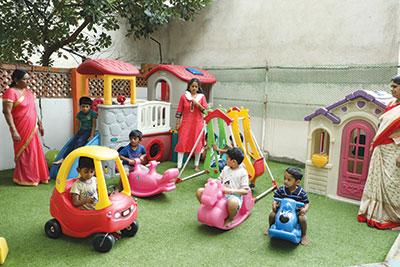Tamil Nadu – Overdue attention
 Three years after the jayalalithaa-led all india Anna Dravida Munnetra Kazhagam (AIADMK) government of Tamil Nadu promulgated India’s first code of regulations for play schools (aka pre-primaries/preschools), and also drafted an activity-oriented syllabus for children in the 1.5-3.5 years age group, the incumbent E. Palaniswamy-led AIADMK government released a new draft syllabus for the state’s 150,000 preschools (pre-kindergarten/nursery), Lower Kindergarten (LKG) and Upper Kindergarten (UKG)) schools on October 11.
Three years after the jayalalithaa-led all india Anna Dravida Munnetra Kazhagam (AIADMK) government of Tamil Nadu promulgated India’s first code of regulations for play schools (aka pre-primaries/preschools), and also drafted an activity-oriented syllabus for children in the 1.5-3.5 years age group, the incumbent E. Palaniswamy-led AIADMK government released a new draft syllabus for the state’s 150,000 preschools (pre-kindergarten/nursery), Lower Kindergarten (LKG) and Upper Kindergarten (UKG)) schools on October 11.
Based on the National Council of Educational Research and Training (NCERT) curriculum framework for pre-KG and KG schools and localised by the Tamil Nadu State Council of Educational Research and Training (TNSCERT), the draft syllabus is scheduled to be implemented from the academic year 2019-2020 in the state’s 34,342 government primaries in a phased manner as most government schools currently don’t offer preschool education; and in over 10,000 private matriculation schools offering preschool education. The time window for suggestions from educationists, teachers and parents closed on October 30.
Taking a cue from the NCERT syllabus, the Tamil Nadu draft preschool syllabus prescribes gross motor, fine motor, sensory, cognitive, socio-emotional and language skills for three different age groups — pre-KG children aged 2-3 years; LKG children aged 3-4 years and UKG children aged 4-5 years. It also suggests how these skills can be developed. Preschool hours have been extended from 3.5 hours (9.30 a.m-1 p.m.) to 6.5 hours (9.30 a.m-4 p.m.) from the academic year 2019-20 for all pre-primary students.
Moreover to guard against imposition of heavy learning loads on toddlers, the draft syllabus restricts LKG learning to English and Tamil alphabets and counting numbers 1-50; and to learning capitals, lower case alphabets in English, Tamil vowels and consonants and counting numbers from 1-100 in UKG. Although several school readiness activities including clay modelling, spray painting, etc, have been recommended, the new draft syllabus doesn’t prescribe any written exercises for preschool children.
Unsurprisingly, the draft syllabus for preschools has evoked mixed reactions from parents, teachers and educationists. Although they acknowledge that the syllabus is holistic and promotes joyful, stress-free learning, the extension of preschool timings to 6.5 hours has sparked a controversy. While the majority dual income nuclear households welcome the extended preschool hours as they will provide day-long safety and care and enable the early development of social skills of infants, some child psychologists believe the prolonged hours of separation will be inimical to parent-child bonding.
“The extended timings will tire preschool children and the long hours of separation from parents may lead to serious emotional issues. The multiple skills that youngest children have to learn can easily be taught in 3.5 hours. Another anomaly in the draft syllabus is the preschool age group of 2-5 years after which children are admitted in class I. This goes against the Right of Children to Free and Compulsory Education (RTE) Act, 2009 which mandates that children should be admitted to class I only after completing six years of age,” says Dr. K. Shanmugavelayutham, convenor, TN-FORCES, a forum for creche and childcare services in Tamil Nadu.
Moreover, educationists are surprised that there is no mention in the draft syllabus of ways and means to improve preschool childcare and learning in Tamil Nadu’s government schools and anganwadis (nutrition centres for infants and lactating mothers) which are also mandated to provide ECCE. Established under the Central government’s Integrated Child Development Services (ICDS) programme (1976), the state’s 54,439 anganwadis lack proper infrastructure, teachers and learning materials.
Yet, perhaps the significance of the TNSCERT’s draft syllabus is not in its design and details but that for the first time, early childhood care and education, which according to the majority of Western educationists, is more important than school or higher education, has been given official importance and a place in the sun.
Hemalatha Raghupathi (Chennai)














Add comment